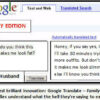 Recently my college-age daughter Rachel emailed me, asking for help with a problem. Such an event – being rarer than a sighting of Halley’s Comet – calls for all-hands-on-deck-full-throttle parental engagement. “I’m there for you, Rachel.”
Recently my college-age daughter Rachel emailed me, asking for help with a problem. Such an event – being rarer than a sighting of Halley’s Comet – calls for all-hands-on-deck-full-throttle parental engagement. “I’m there for you, Rachel.”
Thus began an email exchange that I am proud to say profoundly impacted my daughter and our relationship. Her gratitude for my sage advice is evidenced in her words that, well, she couldn’t even put into words how helpful I was.
Rachel: Hey, Dad. Wanted to ask you something. My boyfriend Brad and me had a fight. I saw him with my best friend Brianna. They were holding hands. He says she’s just a friend, but I think he’s lying. Should I confront him?
Me: Thanks for your email, Rachel. I am happy to help. Frankly, this is a common problem for many young people. In fact, your mom often struggled with similar issues when she was your age.
Here are my suggestions. First, never start a sentence with a verb unless it’s a command. When you write “Wanted to ask you something”, the reader is left wondering: Who wanted to ask me something? My daughter? My boss? A strange man in a tall hat? You never want to leave your reader guessing.
Also it’s not “Brad and me had a fight.” It’s “Brad and I.” Me is the objective form of the first person pronoun. In this context, however, you need the subjective form.
Rachel: Whatever, Dad. I don’t think you understand. I think Brad is cheating on me. Last nite, I texted him. No reply. No idea what he’s up 2. What should I do?
Me: Well, I can think of a couple things to do. First, consider using Spellchecker. It would have caught your misspelling of “night” immediately. Secondly, you have a dangling preposition in that same sentence, which you compounded by writing the number “2” when you meant the word “to”. Try rephrasing your sentence this way: “I have no idea what Brad is doing.”
Rachel: I don’t care about dangled propositions, Dad. I want you to really listen to me. Do you understand my problem?
Me: Yes, I think I do. Your problem is that you have a split infinitive in your sentence “I want you to really listen.” You should never insert a word between “to” and the verb it modifies, in this case “listen.” You know, it always bothered me during Star Trek episodes when they would say “to boldly go where no man has gone before.” That’s just plain wrong. It should be “to go boldly where no man has gone before.”
Rachel: Focus, Dad! How did we get off onto Star Trek? Your not listening to me.
Me: I think you meant to say, “You’re not listening to me.” You made the common mistake of confusing the second person possessive with the contraction for “you are.” It would be proper, for example, to say “your feelings have been hurt because you’re convinced that Brad is cheating on you.“ Do you understand?
Rachel: No, Dad. Do YOU understand???!!! Did you even hear a word I’ve been saying? I think Brad is sleeping with my best friend. I think he may be more into her then he is into me. What would you do?

Rachel: Arrrrgggghhh!!! I don’t care about the difference between “thin” and “then”. I’m telling you, Brad is like totally ignoring me for that slut.
Me: Rachel, Rachel, Rachel. We just went through this. It’s “than” and “then.” Please pay attention.
Rachel: Hello? What planet are you even on????
Me: That would be “On what planet are you?” Would you like me to go over the dangling preposition issue one more time? And a single question mark at the end of your sentence should suffice.
Rachel: NO, I DO NOT WANT YOU TO GO OVER THE DANDILION PROSTITUTION ISSUE ONE MORE TIME!!! Do you want to help me or not? Should I dump Brad before he dumps me? I can’t stand the thought of him with Brianna. Its starting to effect my schoolwork.
Me: No it’s not.
Rachel: How would you freakin’ know if its effecting my schoolwork or not?
Me: Because the word you’re looking for is “affecting” – “Effect“ is a noun. And it should be “it’s” – not “its” because “its” is the possessive of “it”, but you were attempting to use it incorrectly as a contraction.
Rachel: That’s a huge help, Dad. Just the advice I was looking for. I could care less about all this drama! I see now that I made a big mistake.
Me: By “big mistake,” I presume you’re referring to your use of the phrase “I could care less” when you meant “I couldn’t care less”?
Rachel: Yes, Dad. That’s exactly the mistake I was talking about. You understand me so well. Sigh. I can’t put into words how, um, unexpected, your advice has been. : v (
Me: I’m so pleased. Rachel, it means a lot to me that we had this little chat.
Rachel: Whatever. By, Dad.
Me: Um, that would be “Bye, Dad.” The word “by” is a preposition meaning near or next to. Love you, sweetie.
I feel I made a genuine connection with my daughter. I’m glad I could be there to help her work through her many problems. She is such a sweet girl. I wonder how things are going for her with her boyfriend, Brad. He seems like such a nice young fellow.
That’s the view from the bleachers. Perhaps I’m off base.

© Tim Jones, View from the Bleachers 2014











Lessons in Grammar! Whew …. Let’s hope I enter all the correct language in this comment. There was grammar in your post that I didn’t know and I still don’t know. Good work Tim.
Perfect advice, Tim! Your daughter is so lucky!
Thanks for the hearty laugh.
Lynn
Love it Tim! By which I mean, “I love it.” 🙂